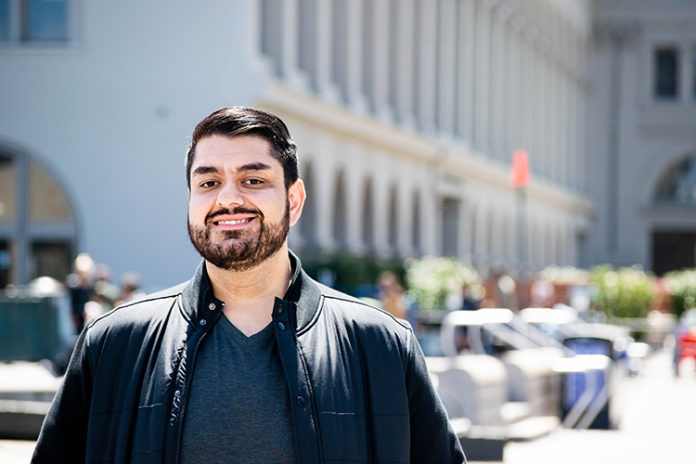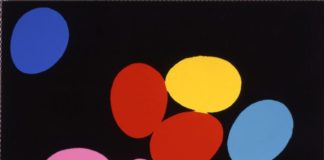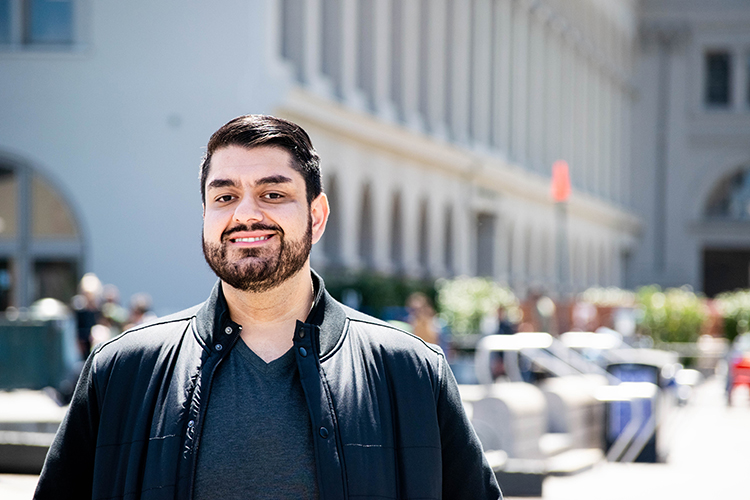
“When your life flashes before you, part of you changes,” said Harris Mojadedi, a student fee analyst in the Division of Student Affairs. “I’m grateful for that change.” (UC Berkeley photo by Irene Yi)
The COVID-19 pandemic has separated us, but sharing stories about how members of the campus community have been surviving — and even thriving — since spring 2020 can help draw us together. Berkeley News is gathering inspiring personal tales of heartache and triumph related to the coronavirus and will run them periodically. To pitch us your story, send a brief email to news@berkeley.edu. Check out the whole series here.
This is the ninth story in the series. It highlights Harris Mojadedi, a student fee analyst in the Division of Student Affairs.
In July 2019, Harris Mojadedi knew he’d hit the tipping point. While walking from the campus’s Residential Student Services Program building to the student union, the UC Berkeley staffer had to stop three times to rest.
“I’d reached my highest weight, 450 pounds,” said Mojadedi, a student fee analyst in the Division of Student Affairs. “I couldn’t walk from point A to point B. I was 29 years old, my legs hurt, and I felt awful every day.”
Later that year, Mojadedi would confront another serious challenge: a cancer diagnosis — Hodgkin’s lymphoma.
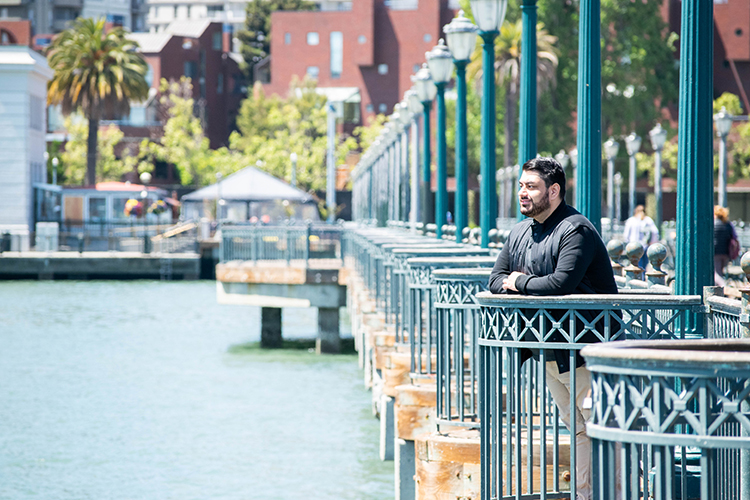
Sheltering in place during the pandemic forced Mojadedi to look closely at his challenges, and how to address them. “There’s been an internal awareness that’s come out of the quieting of the chatter and noise,” he said. (UC Berkeley photo by Irene Yi)
But today, as California begins to recover from the COVID-19 pandemic, Mojadedi said he is emerging from his personal struggles as a “changed person” who’s lost more than 200 pounds through diet and exercise, is in cancer remission, and chose last fall to reveal to his extended family that he is gay.
That his life has taken a positive turn “while hundreds of thousands of people have lost their lives in ways that could have been preventable, had we shown up differently for the task,” is unsettling, he said. “COVID-19 has been horrible.”
Yet, being sheltered in place at his home in Union City, and now in San Francisco, for more than a year has brought a critical interruption to Mojadedi’s hectic life — to his 1½-hour daily commute, each way, to Berkeley; to juggling his participation on numerous campus committees and his job in student affairs; to his weekends spent networking and prepping to run for a local city council seat.
“Everything froze, life itself,” he said. “It became just me, front and center. Just me. I’ve had to sit with myself, be present with myself in a way that my daily life wouldn’t allow me to before. There’s been an internal awareness that’s come out of the quieting of the chatter and noise. I’ve really been able to come into my own.”
For those like Mojadedi who have lost their well-being, he said, “It’s important to ask what our challenges are, and then to ask, ‘What am I going to choose to do?’ And that’s hard. We all have areas for improvement, things to do better, so life turns out differently.”
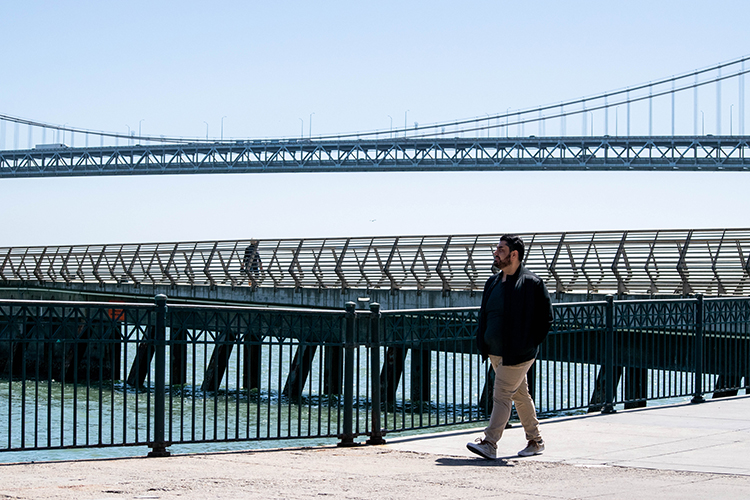
Harris Mojadedi savors his daily long walks through San Francisco. In the past, it had gotten difficult for him to travel relatively short distances on foot. (UC Berkeley photo by Irene Yi)
Losing balance
His whole life, Mojadedi has been overweight, and it was exacerbated at home and at school.
“The only issue that mattered to my parents was that I needed to lose weight,” he said. “It was an issue at elementary school. I remember being teased and bullied. But I found ways to handle it, through humor and friendliness. I learned how to adapt.”
In middle and high school, his sincere and compassionate nature led him to make meaningful friendships. “And, I was obese,” he added. “And what was not known to me then was being gay, and not having the words for it.”
Mojadedi went on to San Jose State University, then to St. Mary’s College for his master’s degree. At San Jose State, he began to discover the fields of study and types of community work that meant the most to him.
“I studied political science and was so ridiculously involved in everything in student life you can imagine. I was a resident assistant, a student leader on several campus committees, I worked as a mentor for the EOP (Educational Opportunity Program), I was in a lot of leadership roles,” he said.
He also kept gaining weight. He explained, “Eating is a coping mechanism for me when I feel out of balance.”
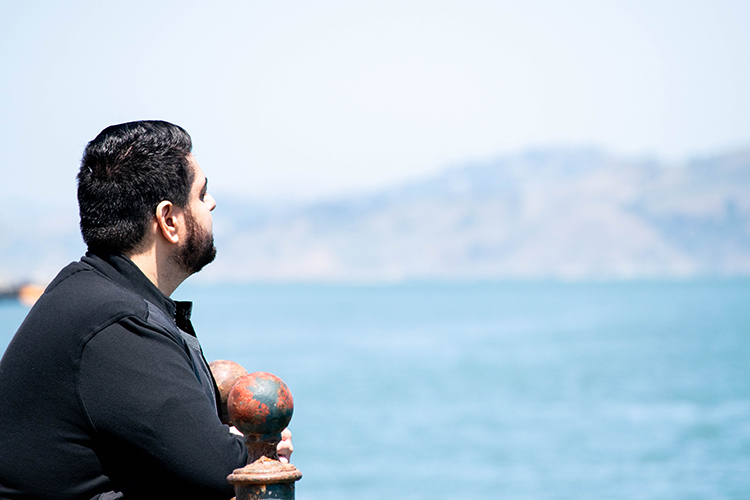
During the pandemic, Mojadedi’s formerly hectic life, in which he’d lost his well-being, came to a halt. “It became just me, front and center,” he said. (UC Berkeley photo by Irene Yi)
That’s how Mojadedi felt — out of balance — in April 2019, when he won a Chancellor’s Award for Public Service at Berkeley. It was the staff award for civic engagement, for spending his free time advocating for housing rights. At the time, he was the young chair of the Union City Planning Commission and the Alameda County Human Relations Commission, and a member of the Union City General Plan Advisory Committee.
At the chancellor’s ceremony, a photo was taken of all the awardees with Chancellor Carol Christ. “I was so unhappy,” he said, “and you could see that on my face.”
A few months later, in July 2019, when his weight had reached 450, “I was in a fog,” he recalled. “But I saw the red flag that told me I needed to do something for me. I needed an inward shift.”
One of Mojadedi’s Berkeley colleagues helped by recommending that he take the Enneagram Personality Test. The results gave him insight.
“I learned that I’m a peacemaker — by default so externally motivated that I don’t have an agenda for myself. That was a really, really important lesson to internalize. I’m hard-wired to do everything but be with myself,” he said. “Inside, I had everyone else’s issues, but not how to take care of Harris, what the priority is for Harris, what to do to achieve my own goals. It illuminated so many areas where I was unhealthy — professionally and in my personal life.
“So, I decided to do something about it. And it’s a decision I still have to make every day.”
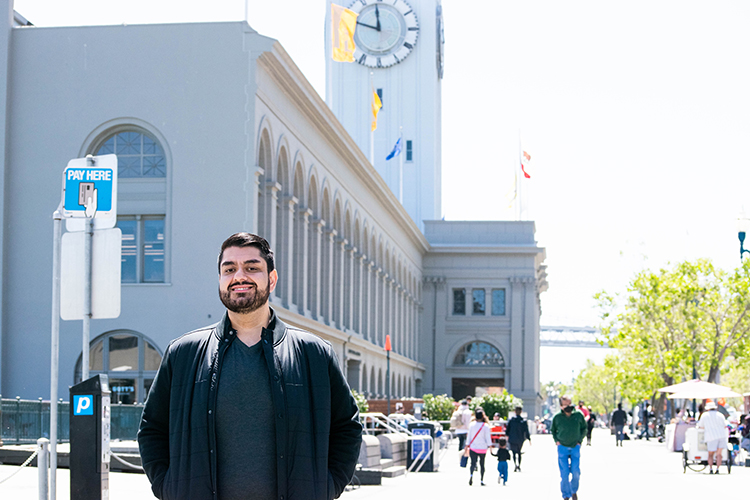
“I’m still coming into my own,” said Harris Mojadedi. “I’m still learning. I’m still on this journey. I haven’t had an aha! moment or a light bulb go on. But I’m present with myself.” (UC Berkeley photo by Irene Yi)
‘You have cancer’
Mojadedi made a commitment to eating healthy and exercising, joined a support group for food addiction and found a therapist. His biggest adjustment, he said, was “that I had done so much of my socializing around food — lunch, dinner, eating out, eating bad food — and then I had to pivot to bringing my own lunch, not going out to dinner, eating at specific times.”
By October 2019, he’d found he had more energy — and had lost 90 pounds.
But in early November that year, he went to the doctor for a check-up, concerned about a lump on the right side of his groin. He’d had a biopsy the previous month, and an ultrasound, but the results had been inconclusive. “You’re young, it’s nothing,” the doctors had told him.
But blood work was ordered, and it revealed something definite. “I’m sorry, sir, you have cancer,” he was told.
After that, Mojadedi said he had “a few scares” with the cancer and, in December 2019, underwent radiation therapy “that zapped my energy. Then, there were months of waiting to see if I needed more treatments, to see if the cancer was gone.” He returned to his job at Berkeley in February 2020, right before COVID-19 shut the campus down.
Today, he’s in remission and, like facing his weight problem, “the cancer really changed my outlook on life,” he said. “When your life flashes before you, part of you changes. I’m grateful for that change. When I got the diagnosis, I wasn’t thinking about the city council race. I was thinking about my family and friends and enjoying life. Coming off the cancer treatments, I had so much gratitude, and I realized I didn’t want to waste time during the pandemic.”

“Every day, I’m living my best life, going on walks, meditating,” said Mojadedi. “Every day, I try to make the best out of situations, knowing that I am grateful to simply be here.” (UC Berkeley photo by Irene Yi)
First, show up for yourself
Today, Mojadedi is living in San Francisco, which had been a “pipe dream,” he said, adding, “At 450 pounds, I couldn’t imagine walking a block in the city, let alone up and down the hills.”
He’s creating new routines for his morning and evening walks, which sometimes include heading from his apartment, which is uphill from Union Square, to Market Street, then to the Ferry Building, to Fisherman’s Wharf, and then back up into the hills.
“Every day, I’m living my best life, going on walks, meditating, expressing gratitude,” he said. “Every day, I try to make the best out of situations, knowing that I am grateful to simply be here.”
He said he’s “jazzed and juiced” about returning to work on the Berkeley campus, but also hopes there will be a way to work from home several times a week.
Mojadedi said he’s realistic about his progress, knowing “that it’s one day at a time.”
“I’m still coming into my own. I’m still learning. I’m still on this journey,” he said. “I haven’t had an aha! moment or a light bulb go on. But I’m present with myself.”
It’s important for members of the campus community to know they “have a lot of agency over life,” said Mojadedi. “And that, even amid all that’s going on, like the pandemic and racial injustice, in our country and the world, we will be asked to show up for students, staff, family, our partners.
“But we can’t show up for others until we show up for ourselves.”

